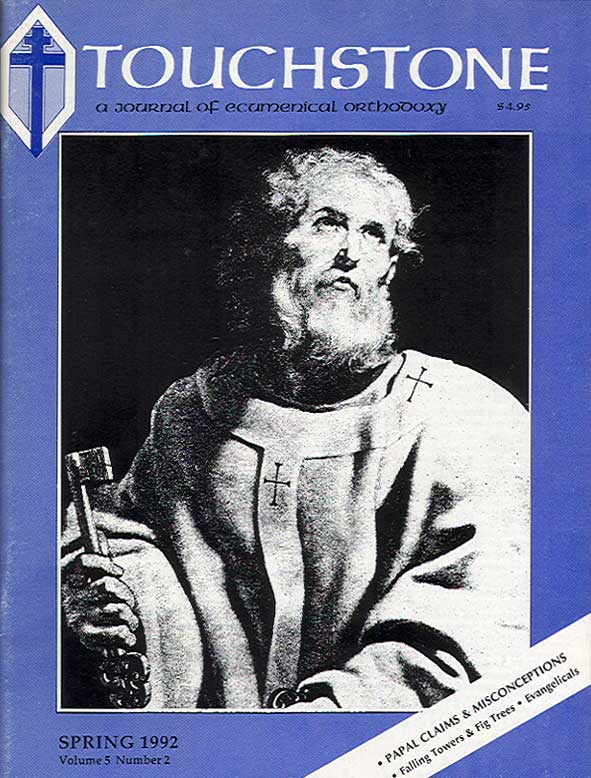On Falling Towers and Fig Trees
A Sermon by S. M. Hutchens
I.
Today’s New Testament readings, which we will review presently, all speak against the sin of presumption. A presumptuous person is someone who has willfully forgotten that whatever is good in him comes from God’s generosity to a sinner. He malappropriates the grace of God by making it his proper possession, the stuff of self-congratulation. Salvation is transformed from a living relation to a loving and terrible God to a regular fixture of his accustomed world. The means of grace are similarly accepted as “given,” not as unmerited gifts, but as something due because God is obliged to keep his promises. Other divine benefits become viewed not as things loaned for the exercise and testing of stewardship, but as objects of a title deed. One might describe the attitude of a presumptuous person by turning the description of Christ found in Philippians 2 on its head:
This is the mind of the presumptuous, who, finding himself in the form of the redeemed, regards his redemption as something to be grasped, and exalts himself, taking on the form of a master, and who, finding himself in this form, judges his brother to justify himself rather than allowing himself to be judged to justify his brother.
II.
One of the most insidious forms of presumption is carried in gossip about the misfortunes of others.
There were some present at that time who told Jesus of the Galileans whose blood Pilate had mingled with their sacrifices, and he said to them, “Do you think these Galileans were worse sinners than all other Galileans because they suffered thus? I tell you, No; and unless you repent you will all likewise perish. Or those eighteen who were killed when the tower in Siloam fell upon them. Do you think they were worse offenders than all the others in Jerusalem? No, I tell you—and unless you repent you will all likewise perish.” (Luke 13:1-5)
We make an equation or a proportion between the suffering of others and their sins almost reflexively. It is a temptation to be resisted, with fear. Most recently I have found myself doing it when hearing of terrible troubles in other parts of the world—in Ethiopia, Kampuchea, or Russia, for example. It is very natural, I tell myself, that so many years of lies and corruption in these societies should eventually bring confusion, pain, hunger, and death. The chickens must come home to roost: belief in a false religion or ideology, or a debased form of Christianity must eventually show itself for what it is, and bear the fruit that is natural to it. It is tragic, but these Galileans do seem in some ways to be worse than all the rest of us because they suffer thus. There, but for the grace of God go I—but thank God, I’ve got the grace!
Well, no, not so—at least not in the way that I’m tempted to think. It is impossible for us to tell whether the troubles of others are signs of divine wrath or favor. Indeed, they may be both at once, in manners and proportions that are beyond our power to understand. What I regard as the grace that brings me comfort while others suffer may be the mark of my own condemnation, for it is written that “God scourges every son he receives.” What looks like harsh treatment from our perspective may well be a sign of God’s love that must be endured by each of his true children to purify them and test their faith.
Now to be sure, to be massacred at worship or crushed by a falling tower are indeed images of condign punishment for certain kinds of sin. So is crucifixion. I don’t think those who brought the report to Jesus were wrong about this. They got the idea from Scripture to begin with. Where they were wrong was in excusing themselves as those who enjoyed the favor of God because they survived certain tragedies, and using the sign to render judgment upon those who had not escaped as judged by God—precisely what people who thought themselves righteous did to the dying Jesus, regarding him as stricken, smitten of God, and afflicted, and wondering who had sinned, this man or his parents, that he should meet this end.
We are not allowed to make an equation (or proportion) between the spiritual states of those who suffer and the calamity that has befallen them, for this calls for the power of judgment, which has been delivered by the Father to Christ alone, and which even he has not yet exercised in a final way. We are, however, invited to view the situations themselves as symbols of a judgment to which we ourselves are liable. This calls for an entirely different attitude—indeed, an entirely different condition and habitude of soul than that of the accuser.
The drunkard falls down the stairs and kills himself. The homosexual AIDS patient dies as a direct result of indulging a forbidden lust. It may well be that the ends of people like this have come upon them for precisely the reason that appears. St. Paul is not stepping out of bounds when he asserts as a general truth that people receive in their bodies and minds the due reward of their sins. We are free to see every visible link between sin and its results. But we are not allowed to pronounce or even infer judgment on others, for we do not know—we cannot know—enough to judge well. Even simple cases are infinitely beyond our power in our present state. We are free to regard what has happened as a symbol of judgment for the kind of sins that have been committed. One may even render a legal judgment upon those who commit crimes. This is by no means forbidden by Scripture.
S. M. Hutchens is a senior editor and longtime writer for Touchstone.
subscription options
Order
Print/Online Subscription

Get six issues (one year) of Touchstone PLUS full online access including pdf downloads for only $39.95. That's only $3.34 per month!
Order
Online Only
Subscription

Get a one-year full-access subscription to the Touchstone online archives for only $19.95. That's only $1.66 per month!
bulk subscriptions
Order Touchstone subscriptions in bulk and save $10 per sub! Each subscription includes 6 issues of Touchstone plus full online access to touchstonemag.com—including archives, videos, and pdf downloads of recent issues for only $29.95 each! Great for churches or study groups.
Transactions will be processed on a secure server.
more from the online archives
calling all readers
Please Donate
"There are magazines worth reading but few worth saving . . . Touchstone is just such a magazine."
—Alice von Hildebrand
"Here we do not concede one square millimeter of territory to falsehood, folly, contemporary sentimentality, or fashion. We speak the truth, and let God be our judge. . . . Touchstone is the one committedly Christian conservative journal."
—Anthony Esolen, Touchstone senior editor










